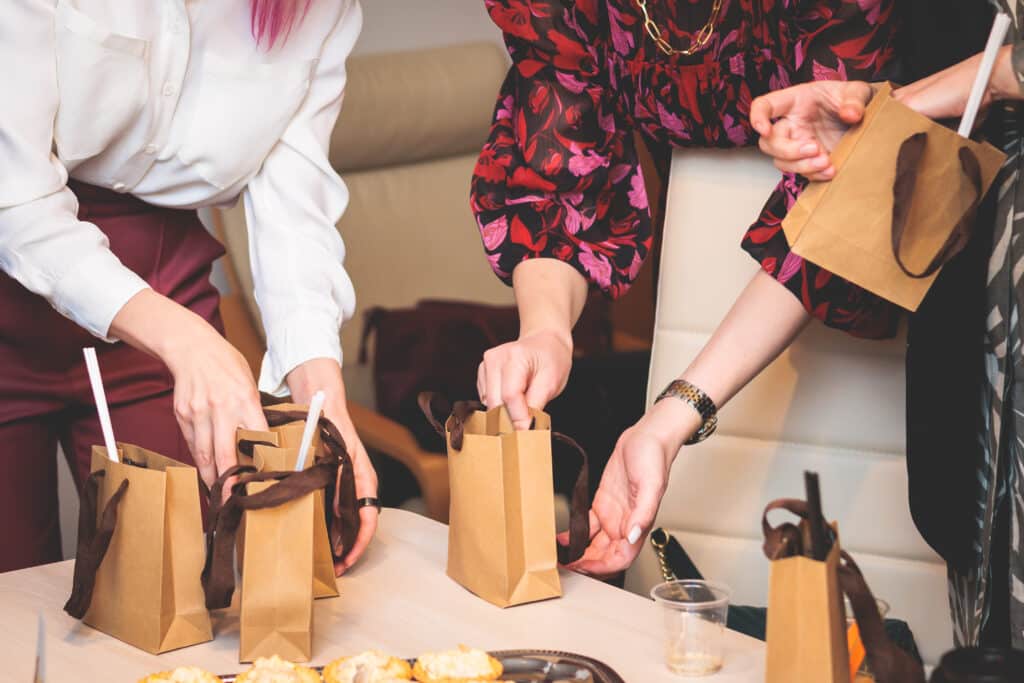Collaborative relationships hold much importance within modern work environments. As research has shown, groups that communicate openly and feel psychologically safe together cultivate a level of cohesion. This connection enables greater success across critical areas like output, creative progress, and personal fulfillment.
Yet tensions often arise when in ambitious, fast-paced, or remote environments. While generic team-building activities may fall flat, thoughtfully personalized gifting can be a simple and powerful way to build rapport.
Why Collaboration Matters
Collaboration involves people working together toward common objectives. When done effectively, it allows team members to utilize their individual talents while balancing weaknesses as a unit. Teams that collaborate seamlessly through understanding roles, welcoming feedback, and supporting teammates perform better across key metrics like output quality, problem-solving, and job satisfaction.
However, numerous hurdles stand in the path of creating truly cohesive teams. Corporate gifting Christmas presents can show prime opportunities to show employee appreciation when bringing together diverse perspectives and needs. Challenges like unclear goals, communication gaps, and unconstructive conflict require continual dedication.
Even team-building activities meant to connect individuals through mandatory fun often struggle to cultivate authentic relationships within limited timeframes. Yet thoughtfully personalized gifts prove powerful in conveying understanding and recognition that strengthen interpersonal bonds, establishing a basis for psychological safety to enable collaboration through tensions.
The Power Of Gift-Giving In The Workplace
Thoughtful gifts hold unique potential for bringing teammates closer by eliciting positive emotions. Giving gifts allows individuals to feel recognized and valued for their unique personality, knowledge, and talents.
The inherent care put into selecting personally relevant gifts facilitates trust, connection, and willingness to support others’ development. While rewards and cash bonuses may temporarily boost morale, heartfelt gifts strengthen interpersonal bonds and lead to sustained collaboration.
The psychology of gift-giving shows that it can release dopamine and spark long-lasting positivity. The gesture communicates, ‘I understand you, remember our time together, and care about making you happy.’ Its voluntary nature conveys genuine appreciation rather than obligation.
Leaders can harness gifting thoughtfully not merely for holidays but to enable various benefits. These include heightened positivity, empathy, and connection underpinning thriving collaboration even during stressful times. With boosted morale and employee engagement through gifts, you can further build your brand’s identity together.
Choosing The Right Gifts For Collaboration
When selecting thoughtful gifts, consideration for factors like budget, variety across personality types, and usefulness heightens relevance. Gifts that express empathy and enable shared experiences are particularly effective in uniting teams.
Gift Selection Strategies:
- Team Type: Outgoing sales teams may appreciate concert tickets, enabling social fun. Meanwhile, research groups might favor subscription boxes delivering the latest gadgets and puzzles tailored to their analytical strengths. It also helps to understand the personalities of everyone in each team to get better ideas of what to give them.
- Budget: Keep your company’s budget in mind when planning thoughtful gifts for the team. You may have grand ideas, but your finances are unable to turn them into reality. Establish price tiers for gifts, such as $10, $25, and $50 levels, to enable generous recognition that aligns with team members’ varying income ranges.
- Personalization: Customize your gifts whenever possible. You can do this through engraved items, compilations of the recipient’s favorite things, or photo books celebrating individual and group growth and impact.
Gift Ideas:
- Experiences: Foster connections by gifting collaborative escape rooms, cooking classes, and building workshops that require the application of shared strengths. These activities not only promote fun but also encourage team members to interact and work together.
- Collaborative Tools: Surprise teams with multiplayer games, jigsaw puzzles exchanged between desks, or subscriptions delivering coding challenges, provoking problem-solving discussions. Food, such as cultural snack boxes that teams can share, can also play a significant role in building stronger teams.
- Meaningful Gifts: Emphasize company values via donations to charities chosen by teams or tokens engraved with sayings like ‘The Whole is Greater than the Sum.’ Eco-friendly and fair-trade products strengthen culture, especially between team members who are actively supporting meaningful causes.
- Virtual Options: Thoughtfully include remote members in your gift-giving process. Deliver multiplayer videogames, custom digital avatars, online learning package shared access, or food delivery gift cards to their doorstep. This simple act brings joy from afar and lets your remote team know that they’re still on your radar.
Gifting cash may be appreciated by most, but corporate gift cards to favorite stores tend to carry more personal intent. Handwritten notes further heighten the gesture’s meaning. Opportunities for mental and physical wellness, whether performed in or out of the workplace, will also be beneficial for the team. Even small trinkets representing inside jokes hold disproportionate relationship-building power.

Implementing Strategic Gifting For Team Building
Rather than limiting appreciation to particular occasions, interspersing thoughtful peer-to-peer gifting year-round enables a culture of gratitude, celebration, and community.
- Set guidelines for voluntary recognition aligned with company values like excellence, growth mindset, or inventor spirit. For example, publicly recognize someone who solved a long-standing client problem with an unexpected creative solution.
- Incorporate time for gift presentation, storytelling, and recipient reactions into meetings. Consider dedicating the first 10 minutes of monthly meetings for two to three employees to share a ‘recognition story’ about a peer.
- Encourage written or publicly posted gift reflections reinforcing lessons learned about each other. Create a Slack channel for posting gift reactions highlighting new things learned about teammates as well as the actions inspired by feeling appreciated.
- Suggest screenshots of gifted experience enjoyment be added to a collaboration success scrapbook. Compile images of team members enjoying concert tickets, escape room victories, or sporting event selfies into a digital scrapbook memorializing productive team fun.
Preparing guidance on recommended spending, gift decision drivers, and inclusive practices helps streamline meaningful processes. Redirecting envious reactions into appreciation for one’s own gifts also proves essential.
Measuring The Impact
Compare employee engagement survey collaboration sub-scores year over year. Practice this while continually refining gift strategies based on anonymized recipient feedback around relevance, creativity, and meaningfulness.
Alongside tracking productivity metrics, calculate the percentage of gifts fueled by peer-to-peer recognition vs top-down distribution to gauge organic culture stickiness. Monitor the rate of participation equality across demographic groups.
Gift-Giving To Build A Stronger Team
The ability to understand colleagues and spot opportunities for spurring inspiration separates average from high-performing teams. While collaboration presents innate challenges, gift-giving rooted in individual understanding moves relationships in an uplifting direction. Experiment while expressing genuine appreciation through relevance and creativity to unlock your team’s full potential.


